All Saints of Cluny Monastery
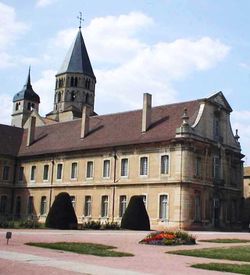 Today, on April 29, we commemorate all the Benedictine Saints of the Monastery of Cluny in the Burgundy region of France, among whom are the three great Abbots, Sts. Odo, Majolus, and Odilo.
Today, on April 29, we commemorate all the Benedictine Saints of the Monastery of Cluny in the Burgundy region of France, among whom are the three great Abbots, Sts. Odo, Majolus, and Odilo.To honor them, the Vespers hymn proper to their feast:
The joyous festival again
Returns, of those renowned men,
Our Fathers, who with honest heart
The world rejected, for their part.
We celebrate their yearly feast
With bright solemnity: and least
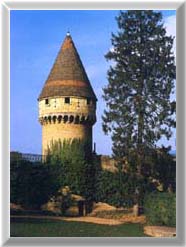 Among their followers, we pray
Among their followers, we prayTheir help to purge our stains away.
By earnest supplication now,
And subject to our solemn vow,
O may their intercession win
A tender pardon for our sin.
All laud to God the Father be;
All praise eternal Son to Thee;
All glory as is ever meet,
To God the Holy Paraclete. Amen.
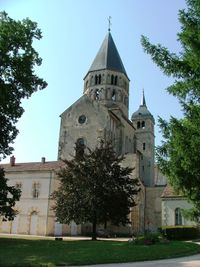 Collect:
Collect: Let us pray. O God, Who dost gladden us by the festival of all Thy Saints of Cluny and dost urge us to advance by imitating them, grant that as we venerate them with our homage we may also follow in the example of their holy life. Through our Lord Jesus Christ, Who liveth and reigneth with Thee and the Holy Spirit, ever one God, unto ages of ages. Amen.
[Liturgical texts from the Farnborough Monastic Diurnal with some edits.]

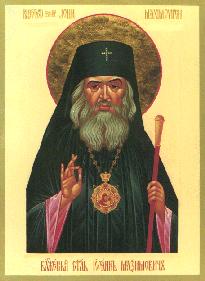

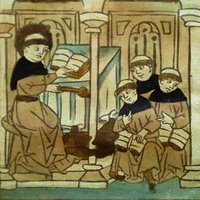




6 Comments:
Amen.
When I visited the New Norcia monastery last year, the historic readings at dinner mentioned Cluny. Very interesting.
And I just read about it again in this book. Fascinating place.
dear John, which Church calendar do you use? Old or Julian revised?
I have lots of lacks in my saints lives, but on 29th April, I had only one abbot of Cluny
http://www.amdg.be/sankt/avr29.html
interesting to have others & prayers, thank you, I'll keep for translation next year
Jean-Michel
http://www.orthodoxe.be
(I hope no "dupe" message, blogger works bad these times from here :((
Jean-Michel,
Que Dieu vous benisse! (I hope my grammar was good.)
The calendar I used was the 1963 RC Benedictine calendar in the Farnborough Monastic Diurnal. I don't know if there is a WR Orthodox commemoration day for the Saints of Cluny. There may be for the ER calendars. (I don't know if these Saints of Cluny are on the AWRV or RC-Christminster calendars. It would be good to know. I'm still in the long process of putting all that together.)
Hugh, who was also listed that day in the RC Diurnal, died after the schism. Since Cluny is a continental monastery and not British, Irish, Scotish, or Scandinavian, the general cut off date is 1054.
Hugh of Cluny lived from 1024-1109. Thus, he died after the Antiochian schism of 1100 and the Papal Reformation of the late 11th century. However, he was born in the Orthodox period and I think one can reasonably say that Hugh was not a participatory apostate, but rather that, because of dates and far-away circumstances, he's not on the Orthodox calendar. It's too bad. I can see why Pope Gregory VII isn't on the calendar, but Hugh (Hugo), who is also commemorated in the Lancelot Andrewes MD reprint, was certainly a devout and pious man. The Vesperal Antiphon for him in the MD reads: "While blessed Hugo was assisting at the sacred mysteries on Holy Saturday, he saluted the column of new light with repeated sighs, entreating that he might happily reach the land of promise, alleluia."
Christ is risen!
Hello again
I totally share your vision of that fact that we fist have to look what the man really was, before saying "hooo, too bad, he died after 1054".
Btw, 1014 is the date when pope of Rome accepted (under Germanic direct presure) the inclusion of the "filioque" in the Symbol. And 461 the date when it was first put in the Symbol in the West, in Spain...
So 1054 is a big theory, and in the East, they are lots of people in the calendar that we have to accept "by obedience" but not because we believe they were really saints.. only friends of the guy who made the calendar of their Church later on...
(btw, good grammar :-)
Jean-Michel
My sources said the Filioque was added in the 6th century under St. Isidore of Seville, but it was apparently an idea circulating over much of the Christian world before and after the Spanish council.
Personally, the Filioque isn't wrong on its own. It depends on how "proceed" is understood. Since the Latin word did not exactly translate the full meaning of the Greek word, which meant that the Holy Spirit procedes from the Father as from the source. So, it's doubtful whether the Latins before the schism understood the procession of the Holy Spirit as a real, double-sourced procession or whether they believed that the Holy Spirit proceded from the Son in that the Son is fully God. I agree the addition was a mistake, but the key is in how its meaning is understood.
As for the Saints we accept under obedience, which ones do you mean?
Post a Comment
<< Home